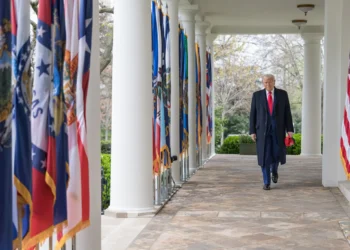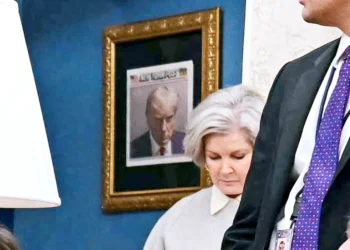US Rep. Matt Gaetz, a member of the House Judiciary Committee, went viral Monday night for demanding transparency over the Federal Bureau of Prisons’ refusal to grant him an interview with Peter Navarro. He cited Navarro’s designation as “too notorious” for such interaction, which got Steve Bannon’s attention—and not in a pleasant way.
“Notorious” refers to being widely known or famous, typically for some unfavorable or negative reason. It often implies a reputation for wrongdoing or scandal.
Gaetz questioned this rationale, noting that even infamous figures like John Gotti have been interviewed while incarcerated. Gaetz underscores the injustice of Navarro’s treatment, including being denied access to legal representation, amid questionable charges linked to the January 6 committee. Gaetz discussed the urgency of rectifying this situation, especially in light of potential political motivations and the anticipation of President Trump’s return to office.
Navarro, a former White House adviser, has become the first high-ranking official from the Trump administration to be incarcerated due to the events of January 6, 2021. He received a four-month sentence for contempt of Congress after refusing to comply with a subpoena, citing executive privilege, which was rejected. Navarro has served two months.
Questions have arisen regarding Navarro’s treatment and whether he is being held as a political prisoner. It is customary for House members to investigate such concerns. Reportedly, Navarro is not mail, visitors, or allowed access to his attorney.
During a speech on Monday night, US Rep. Matt Gaetz defended Navarro on the House floor. His remarks sparked controversy, with Steve Bannon, the host of WarRoom, demanding significant repercussions in response to Gaetz’s statements.
Bannon is calling for immediate action.
Bannon called for immediate action, demanding the dismissal of Colette Peters, the director of the Federal Bureau of Prisons and insisted that Peters should be summoned before Congress to address Navarro’s mistreatment and expressed frustration with the lack of response from lawmakers, particularly citing Speaker Mike Johnson.
He condemned the notion that Navarro was deemed “too notorious” for interviews, branding him a “purely political prisoner” and urging congressional hearings for accountability.
Bannon blasted the treatment Navarro has received, stating:
“And this is one of the reasons McCarthy and Johnson and everybody should have gotten to work on this right away. The WarRoo is calling for the immediate dismissal of the director of the Federal Bureau prisons, Colette Peters. We want her immediate dismissal. She should be hauled before Congress, this afternoon. And this is one of my problems with Johnson is that he knows that Matt Gates made that speech.
He knows that Matt Gates had talked to people in the House and told them that Peter Navarro was not being allowed to be interviewed by Gates because he’s notorious. Then he’s purely a political prisoner. It’s a misdemeanor,Lady. Why are we not starting Tuesday with her in the hot seat in front of a house committee?”
KEY POINT:
No specific law grants US House members the right to visit prisoners in jail to interview them. However, as elected representatives, members of Congress have oversight responsibilities, including monitoring the conditions of prisons and ensuring the fair treatment of individuals within the criminal justice system.
House members may utilize their authority to request visits or interviews with prisoners as part of their oversight duties. These requests may be made formally or informally, depending on the circumstances, and the decision to grant access typically rests with the relevant authorities, such as the prison administration or the agency overseeing federal facilities. Additionally, regulations and procedures may govern such visits, ensuring security and compliance with legal standards.
Bannon underscored the gravity of Navarro’s situation, highlighting that he is incarcerated for a misdemeanor related to defending executive privilege and opposing the “sham” January 6 committee.
Check it out:
WATCH: Steve Bannon GOES OFF on Federal Bureau of Prisons Director for denying my request to interview @RealPNavarro because he’s too "notorious”
"Why is Colette Peters not in front of a congressional committee TODAY?
Why are we not demanding her resignation TODAY?
Why are… https://t.co/j8pLfmVLr5 pic.twitter.com/6UzEY1lFIr
— Rep. Matt Gaetz (@RepMattGaetz) May 7, 2024
Resources:
Collette S. Peters Federal Bureau of Prisons
BillBlaster Ap to contact Congress
The US House Judiciary Committee is one of the oldest standing committees in the House of Representatives and holds a wide range of responsibilities related to law, justice, and constitutional matters.
Some of its key responsibilities include:
- Oversight of the federal judiciary: The committee oversees the administration of the federal courts, including the Supreme Court, lower federal courts, and the judicial branch as a whole.
- Legislation related to the judiciary: The committee considers and reviews bills and resolutions about federal courts, judgeships, judicial procedures, and legal matters.
- Impeachment proceedings: The Judiciary Committee plays a critical role in the impeachment process by investigating misconduct allegations against federal officials, drafting articles of impeachment, and recommending whether impeachment charges should be brought before the full House.
- Constitutional issues: The committee examines constitutional questions, including matters related to civil liberties, constitutional amendments, and the separation of powers among the branches of government.
- Oversight of the Department of Justice: The committee conducts oversight of the Department of Justice, including its agencies such as the Federal Bureau of Investigation (FBI), the Bureau of Alcohol, Tobacco, Firearms and Explosives (ATF), and the Drug Enforcement Administration (DEA).
- Civil liberties and civil rights: The committee addresses issues related to civil liberties, civil rights, and human rights, including discrimination, voting rights, privacy rights, and due process.
- Overall, the Judiciary Committee plays a critical role in shaping and overseeing the United States’ legal framework and ensuring the justice system’s proper functioning.
Bannon is right to demand answers for why a member of the Judiciary Committee is being denied access to interview a man who is incarcerated for a misdemeanor for being too scandal-ridden to care about.






Time for Sri Lanka of the entire government and judicial system.